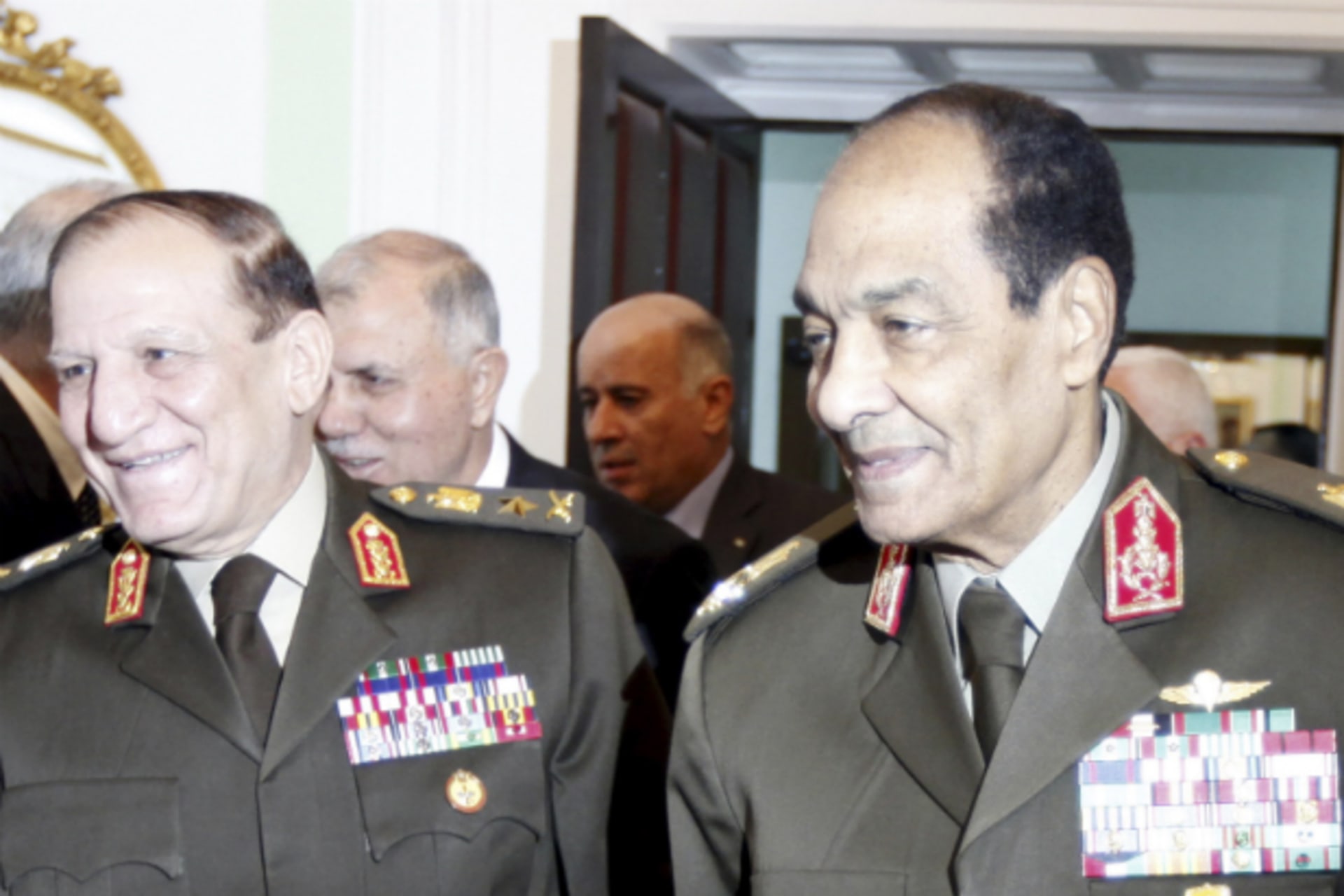Why is Sami Enan Running for President?

By experts and staff
- Published
Experts
![]() By Steven A. CookEni Enrico Mattei Senior Fellow for Middle East and Africa Studies
By Steven A. CookEni Enrico Mattei Senior Fellow for Middle East and Africa Studies
On February 17, Lieutenant-General Sami Enan, Egypt’s former armed forces chief-of-staff, announced that he would be running for president. One can be forgiven for asking: Why? Enan’s candidacy seems impractical and impracticable. Based on what is known publicly, which actually is not very much, it is widely assumed that Field Marshal Abdel Fattah al-Sisi will be the military’s candidate. It seems hard to imagine that if al-Sisi runs, he would have much trouble winning. Despite the crude propaganda in the form of al-Sisi sweets, sandwiches, pajamas, posters, t-shirts, and odes to the man, there are many Egyptians who seem inclined—at this moment—to want the Field Marshal’s firm hand. Enan, whose sterling reputation was tarnished during the 18 months he was the second-in-command of the Supreme Council of the Armed Forces, does not have the kind of broad appeal of al-Sisi. So what is going on? Why does Sami Enan want to be the president? As with everything in Egypt, Enan’s candidacy may (or may not) be a bit more complicated than a man with an ambition to lead a great country back from the brink.
Who is Sami Enan?
On August 12, 2012, it seemed that Lieutenant-General Sami Enan would fade from view. That evening, then-presidential spokesman Yasser Ali announced that Enan and his boss Field Marshal Mohammed Hussein Tantawi were no longer Egypt’s two most senior military officers. There would be more shuffling of the command structure in the coming days, but Tantawi was retired and Enan was made a “military adviser” to the new president, Mohammed Morsi. This seemed like a humiliating end to a successful and well-respected military career—worse than an ambassadorial post in some placid European country. Enan, who trained in France and the Soviet Union, came to prominence in late 1997 when troops under his command chased down the perpetrators of the massacre at the Temple of Hatshepsut (known commonly as the Luxor massacre) that left 58 tourists and four Egyptians dead. A few years later, Hosni Mubarak promoted Enan to lead the air defense command and in 2005 he was elevated to chief-of-staff.
By all accounts, Enan was a popular and highly regarded officer, especially in comparison to the man with whom he will forever be tied, Field Marshal Tantawi. The Lieutenant-General was a primary interlocutor with the United States, where he was well respected. When the January 25 uprising began, Enan was actually in Washington for routine talks with his American counterparts, though they were cut short and he returned to Cairo on January 28—the Day of Rage. At the time, Enan’s Pentagon meetings fueled conjecture about the role of the United States in the uprising, which never amounted to anything other than the idle speculation of people far away and given to believe such things.
Why is Enan running?
It is entirely unclear why Enan has decided to enter the presidential race that now includes himself, Egypt’s Nasserist leader Hamdeen Sabbahi, possibly the lawyer and activist Khaled Ali, and presumably Field Marshal al-Sisi. There seem to be four possible explanations for Enan’s improbable run:
1. Duty. The most innocuous explanation is Sami Enan’s deep sense of duty and patriotism. The same ideas and principles that encouraged him to enter the military academy in 1967 and spend his entire adulthood defending Egypt have inspired him to run for president. In Egypt, where cynicism runs deep, this may not seem to be a likely explanation, but never underestimate the officers’ profound sense of responsibility for the country. Observers may not agree with them, but the commanders themselves believe what they are doing is right for the country.
2. Legitimacy. Lieutenant-General Enan is running in order to give al-Sisi’s candidacy and subsequent election a patina of credibility. This seems strange, but it is not unprecedented. Remember when Omar Suleiman announced his presidential candidacy in the spring of 2012 only soon thereafter to be declared ineligible to run? Omar Pasha’s brief candidacy was a ruse. There was no question that he was going to be disqualified, but that was beside the point. At the same time that Suleiman was running so was Khairat al Shater, the deputy Supreme Guide of the Muslim Brotherhood, and another Islamist, Hazem Abu Ismail. The authorities were deeply concerned about the candidacies of both al Shater and Abu Ismail, but they could not outright bar them from running without creating an uproar and precipitating large demonstrations that would no doubt result from such a decision. So when the Supreme Election Commission banned al Shater, Abu Ismail and Suleiman (as well as a dozen lesser known candidates) at the same time, the government could argue without being totally disingenuous that they were not solely targeting the Islamist candidates, but the apparent standard bearer of the felool as well. In the same way that Omar Pasha’s disqualification gave al Shater’s ineligibility some legitimacy, it is possible that Enan’s candidacy can give al-Sisi’s run for the presidency a sense of credibility. If there are two military figures battling it out, al-Sisi’s election would seem less like a coronation and the coup of July 3 would seem less coup-y.
3. Second Thoughts & Payback. It is also possible that Enan’s candidacy is intended not to help al-Sisi, but rather to encourage him to think again or even damage the Field Marshal’s candidacy. Although not necessarily of different generations of officers—Enan and al-Sisi are only eight years apart—they are of different military academy cohorts and are surely part of different military networks. It is true that at moments of national stress and crisis the officer corps has demonstrated a capacity to act with coherence and common purpose, but it is important to recognize that the Egyptian military is a big organization. It is top-heavy with officers who, despite being socialized and educated in ways to ensure unity, have different views on the important issues of the day. Although observers tend to look at the military through the prisms of October 6, 1973; February 11, 2011; and July 3, 2013, these were extraordinary moments. This is a long way of saying that Egypt’s military establishment does not have “a view,” but rather many of them. Al-Sisi’s likely run for the presidency is probably controversial because it turns everything the military has learned since June 1967 on its head. It is possible Enan’s run is intended to give al-Sisi second thoughts, pulling him back from the brink of making a mistake that will hurt the military as an organization.
Enan might also be seeking to complicate al-Sisi’s candidacy. Observers should not dismiss the possibility of payback. It was the Field Marshal who effectively ended Enan’s military career and as noted above, hardly in the most flattering fashion. When asked recently about his relationship with al-Sisi, Enan’s response was decidedly circumspect and those who can only be described as “Enan surrogates” have expressed concern about the Field Marshal’s presidential aspirations, implicitly suggesting it would not be good for the armed forces. Enan’s entry into the race and the fact that others—including retired officers— are willing to question al-Sisi’s apparent candidacy undermines the sense of the Field Marshal’s inevitability that Egyptian authorities have sought to reinforce in recent months. Enan being another military figure presents a challenge to the Field Marshal that someone like Hamdeen Sabahi does not.
4. The Power Behind the Throne It is also plausible that Enan and al-Sisi are complicit in a broad effort to protect the military and its interests. They may very well understand that an al-Sisi presidency is actually bad for the military, Egypt, and the Field Marshal. As a result, he may opt not to run in favor of the elder, retired military man who is already in the race. There is a possible scenario in which Enan ends up in the presidency, but al-Sisi remains the most powerful man along the Nile. This has significant benefits for the military and al-Sisi. It restores the informal institutional link between the presidency and the senior command, ensures that someone with a similar worldview is in the chair, and allows the military to rule without the complications and dangers of having to govern. This would essentially return Egypt to the pre-uprising status quo in which an officer looked after the interests of the armed forces from the presidency, allowing the military to take a low profile in a political system that nevertheless ensured their power and prestige.
Regardless of how the presidential race develops, it may not be as straightforward as al-Sisi runs and al-Sisi gets elected. The consensus around the Field Marshal and the political process in general is more apparent than real. Everything in Egypt remains contested, even the presidency, and even in the era of Field Marshal Abdel Fattah al-Sisi.
